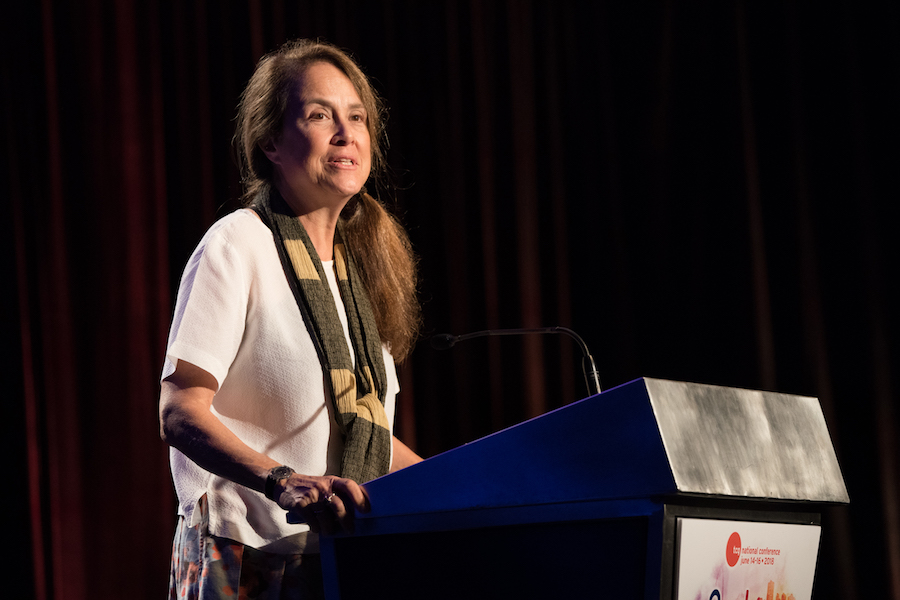I’d like to open with a quote from the poet Naomi Shihab Nye, who was a plenary speaker at Theatre Communications Group’s National Conference in St. Louis last June: “All our lives we are writing and searching for the untold stories. Maybe we won’t find our own untold story. But if we listen well enough we may be able to find one another’s. I believe it can happen. It’s not too late for it to happen.”
As I get comfortable in my chair writing this, it is Dec. 1, World AIDS Day, and I’m reminded of the thousands of untold stories from a generation of LGBTQ people who died from AIDS-related illness. What is my responsibility to share these stories? And what is our responsibility as storytellers to do so? World AIDS Day began in 1988 at the height of the crisis, and remains today as a reminder that HIV has not gone away, and that we must continue to raise awareness, fight prejudice, overcome stigma, raise money, and improve education. It’s a yearly opportunity for all of us to unite in the fight against HIV, to show support for people living with HIV, and to commemorate those who have died from an AIDS-related illness.
I am thankful for the many artists and activists, like Bayard Rustin, who brought the AIDS crisis to the attention of the NAACP; for Sean Dorsey’s The Missing Generation, a beautifully choreographed love letter to a forgotten generation of transgender and other LGBTQ survivors who witnessed and experienced the loss of part of an entire generation to AIDS in the 1980s and ’90s; Michael Dowling’s Medicine Wheel, a 24-hour vigil with an art installation rooted in the Celtic Medicine Wheel; Tony Kushner’s Angels in America, which put AIDS on the national stage; and a name less familiar and a story often untold, that of Robert Rayford, a 16-year-old Black teenager in St. Louis, who died of Karposi’s sarcoma, possibly due to an early strain of HIV, as long ago as 1969.
On this day I mourn the loss of millions and honor all the untold stories like Rayford’s, and the work of thousands of activists and artists who fought and continue to fight for a day of zero transmission, and friends who are living and surviving with HIV/AIDS every single day. You are not forgotten!
In the spirit of storytelling, some of TCG’s stories from 2018 included our National Conference and Fall Forum on Governance, which brought more than 1,000 people from across the country to St. Louis and New York City, respectively; our Equity, Diversity & Inclusion Initiative to transform the national theatre field; our convening of the first Theatres of Color (TOC) Gathering in 15 years, with representatives from 41 TOCs; a banner year at TCG Books, with more than $2.3 million in sales, including for our 16th Pulitzer-winning book, The Cost of Living by Martyna Majok; research for and about the U.S. nonprofit theatre field in the form of Theatre Facts 2017 (next up, the salary and benefits surveys); federal-level advocacy that is helping sustain funding for the National Endowment for the Arts, which this year saw a $3 million increase; and approximately $2 million in grantmaking that supported leadership development, as well as audience- and community-development strategies.
The American theatre also grappled with its own issues around sexual abuse and misconduct. TCG’s response included a comprehensive list of resources and later its September #TheatreToo issue, which focused on #MeToo stories of abuse, harassment, and sexism at U.S. theatres, and how theatres can move forward. The issue is currently a part of theatre coursework at Princeton University, marking a growing trend of TCG publications in classrooms.
As TCG continues to look forward, are we asking the right questions? As the national service organization for theatre, we think and advocate on behalf of our members and strive to reach a service goal. We continue to list member satisfaction and field-wide impact as being critical drivers of success. And for the 14th straight year, we’ve maintained a membership renewal rate of more than 93 percent, indicating the impact and value of our programs and services to our member organizations.
On Feb. 4, we’ll host hundreds of guests at our annual Gala, themed “Our Stories,” in NYC, honoring playwright Tony Kushner, Broadway press agent Rick Miramontez, and arts philanthropist Martha R. Ingram. TCG will also celebrate its long-standing commitment to advancing leaders of color in the field and the many programs that support these efforts.
I also can’t wait to welcome all of you to our National Conference in Miami, June 5-7. If you were at the Fall Forum on Governance back in November, you may have seen the beta version of our new TCG Circle. Simply put, the Circle is TCG’s Facebook for theatre people, offering our members a platform to connect, learn, and share resources and relationships to strengthen their work. The platform supports a user-friendly listserv, a robust knowledge library, private and public groups, and much more.
Much as the circle is universally used in convening practices, TCG will continue to be a space for us to gather, nurture, and strengthen the theatre ecology. On behalf of everyone at TCG, I want to thank you for all your continued support. We never lose sight that we could not publish this magazine or do this work without you. I’m so thrilled and honored that I get to welcome all of you to 2019!


